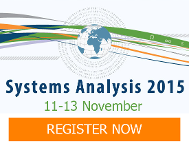12 November 2015
Reducing water scarcity possible by 2050: Linking global assessments to policy dimensions
From 11-13 November 2015, the Systems Analysis 2015Systems Analysis 2015 Conference takes place at IIASA in Laxenburg, Austria. The Systems Analysis 2015 conference is dedicated to Howard Raiffa for his huge contribution to systems analysis. As an influential Bayesian decision theorist, Raiffa is a pioneer in the field of decision analysis, with works in statistical decision theory, game theory, behavioral decision theory, risk analysis, and negotiation analysis. He helped found and was the first director of the International Institute for Applied Systems Analysis. IIASA in collaboration with The Institute for Operations Research and the Management Sciences (INFORMS), USA; the Complexity Institute at Nanyang Technological University, Singapore; and the Santa Fe Institute, USA will host Systems Analysis 2015.
Dr. Yoshihide Wada, a research scientist from the NASA Goddard Institute for Space Studies and Center for Climate Systems Research, Columbia University, USA and very close collaborator of the IIASA Water Futures and Solutions Initiative will speak at the conference representing the IIASA Water Program on 12 November 2015 in Session 3 on The Art and Craft of Systems Analysis. He will not only present outcomes of new innovative and very recent research on water scarcity problems but also on solutions and future management options.
"Water scarcity is not a problem just for the developing world"
In his presentation Dr. Wada describes that water scarcity is not a problem just for the developing world. In California, USA, legislators are currently proposing a $7.5 billion emergency water plan to their voters; and US federal officials last year warned residents of Arizona and Nevada that they could face cuts in Colorado River water deliveries in 2016.
Irrigation techniques, industrial, and residential habits, combined with climate change, lie at the root of the problem. But despite what appears to be an insurmountable problem, it is possible to turn the situation around and significantly reduce water scarcity in over next 35 years.
Strategies in six key areas are identified...read the full abstract
Water resources are central to development and poverty alleviation
The Water Futures and Solutions Initiative brings state-of-the-art science and decision makers together to develop realistic future scenarios that decision makers can use to identify and prioritize robust options to meet these challenges such as water scarcity.By 2050 there will be an estimated 2 billion more people on the planet.
Meeting the needs of those people, and the many who already lack access to clean water, is a huge challenge on an already resource-limited planet. While about 7% of the world’s population has gained access to drinking water during the 13 years since the UN set their Millennium Development Goals, at least a billion still lack access. On top of that, about 2.5 billion people lack adequate sanitation; 35 million people die each year from water-related diseases; about 2 billion are malnourished; three-quarters of the world’s waste water flows to the environment without treatment; a billion people have no electricity in their homes and a similar number lack clean fuel for heating and cooking. Despite economic and social development efforts, the gap between the rich and the poor is growing.
The aims to provide a scientific basis for responding to these challenges by creating and testing a number of scenarios for future water resources, and bringing together decision makers to discuss a common vision for the future.
Vote for the Best Poster
Awards will be provided for best poster of (1) an early-career scientist; (2) a mid-career scientist; (3) Overall
SA 2015 Book of Abstracts
Read all abstracts of the SA 2015 Conference by downloading the book of abstracts



